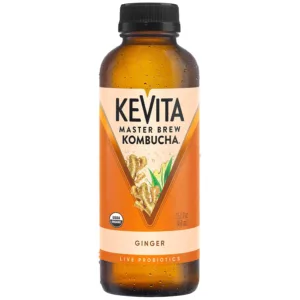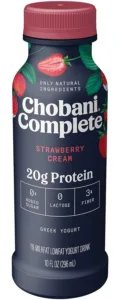
Probiotic drinks have gained immense popularity in recent years due to their potential health benefits. If you have ever wondered what probiotics are and how they can benefit your overall well-being, you have come to the right place. In this comprehensive guide, we will delve into the world of probiotics, explore their role in digestive health, immunity, and mental well-being, and discuss how to choose the right probiotic drink for you.[1][2][3][4]
Top 3 Best Probiotic Drinks
- Lifeway Low Fat Kefir. A tangy, protein-rich smoothie. Packed with probiotics for digestion and immunity, with 15-20 Billion CFU per serving. Lactose intolerance-friendly, up to 99% lactose-free. Elevate your health with Lifeway Kefir.
- KeVita Master Brew Kombucha. Revitalize your routine with this USDA-certified organic kombucha. Billions of live probiotics, lightly carbonated, and brewed with care. Non-GMO, kosher, and gluten-free. Elevate your day with our invigorating kombucha.
- Chobani Yogurt Drink. Fuel your day with 20g of complete protein in every sip. This lactose-free drink is crafted with natural, non-GMO ingredients and boasts no added sugar (not a low-calorie food). Plus added prebiotics and probiotics for an extra boost of goodness. Embrace the power of protein with this delicious and nutritious beverage.
Understanding Probiotics
Probiotics are living microorganisms that, when consumed in adequate amounts, confer health benefits to the host. These friendly bacteria and yeasts can be found naturally in certain foods, such as yogurt, kefir, and sauerkraut, or they can be taken in the form of probiotic supplements or drinks. The most common types of probiotics include Lactobacillus and Bifidobacterium strains, which have been extensively studied for their health-promoting properties.
Probiotics have been a subject of great interest in the field of microbiology and nutrition. Researchers have been investigating the mechanisms by which these microorganisms exert their beneficial effects on human health. It has been found that probiotics can help restore the natural balance of the gut microbiota, which is crucial for maintaining optimal digestive function and overall well-being.
The Science Behind Probiotics
The human gut is home to trillions of microorganisms, collectively known as the gut microbiota. This complex ecosystem plays a vital role in maintaining our health by aiding in digestion, nutrient absorption, and immune function. Probiotics work by restoring the balance of the gut microbiota, promoting the growth of beneficial bacteria and inhibiting the growth of harmful bacteria. They also produce substances that help strengthen the gut barrier and modulate the immune system, contributing to overall well-being.
Research has shown that probiotics can have a wide range of health benefits. For example, certain strains of Lactobacillus have been found to improve symptoms of irritable bowel syndrome (IBS) and reduce the risk of antibiotic-associated diarrhea. Bifidobacterium strains, on the other hand, have been shown to enhance immune function and reduce the severity of respiratory infections.
Furthermore, probiotics have been studied for their potential role in preventing and managing various health conditions, including inflammatory bowel disease, allergies, and even mental health disorders. While more research is needed to fully understand the mechanisms behind these effects, the current evidence suggests that probiotics have the potential to be a valuable addition to our daily health regimen.
In conclusion, probiotics are living microorganisms that offer numerous health benefits when consumed in adequate amounts. They work by restoring the balance of the gut microbiota and promoting the growth of beneficial bacteria. With ongoing research and advancements in the field of probiotics, we are gaining a deeper understanding of their potential to improve our overall health and well-being.[7][8][9]
The Role of Probiotics in Digestive Health
A healthy gut is crucial for optimal digestion and nutrient absorption. The gut is home to trillions of microorganisms, collectively known as the gut microbiota, which play a vital role in maintaining digestive health. Probiotics, also known as “good bacteria,” are live microorganisms that, when consumed in adequate amounts, can confer health benefits to the host.
Research has shown that probiotics have a positive impact on gut health. They have been shown to improve symptoms of various digestive conditions, such as irritable bowel syndrome (IBS) and inflammatory bowel disease (IBD). These conditions can cause discomfort and disrupt daily life, but incorporating probiotic drinks into your daily routine can support a healthy gut microbiota and improve digestive well-being.
Probiotics work by restoring the natural balance of bacteria in the gut. They can help alleviate bloating, gas, and abdominal pain, which are common symptoms experienced by individuals with digestive disorders. Additionally, probiotics promote regular bowel movements, ensuring that waste is efficiently eliminated from the body.
Probiotics and Digestive Disorders
Digestive disorders, such as diarrhea, constipation, and acid reflux, can significantly impact your quality of life. These conditions can cause discomfort, pain, and inconvenience, making it difficult to carry out daily activities. Fortunately, probiotic drinks, rich in beneficial bacteria, can help restore a healthy balance in the gut microbiota and alleviate symptoms associated with these conditions.
Diarrhea, for example, is a common digestive disorder that can be caused by various factors, including infections, food intolerances, and medication use. Probiotics have been found to be effective in preventing and treating antibiotic-associated diarrhea, a common side effect of antibiotic use. By replenishing the gut with beneficial bacteria, probiotics can help restore normal bowel function and reduce the duration and severity of diarrhea.
Similarly, constipation, characterized by infrequent bowel movements and difficulty passing stool, can be relieved with the help of probiotics. These beneficial bacteria can enhance gut motility and promote regularity, making it easier to have regular bowel movements. By improving intestinal transit, probiotics can alleviate the discomfort and bloating associated with constipation.
Acid reflux, also known as gastroesophageal reflux disease (GERD), occurs when stomach acid flows back into the esophagus, causing a burning sensation in the chest. Probiotics have been shown to have a protective effect against acid reflux by strengthening the barrier between the stomach and esophagus. By maintaining a healthy gut microbiota, probiotics can help reduce the frequency and severity of acid reflux episodes.
Probiotics play a crucial role in maintaining digestive health. They have been shown to improve symptoms of various digestive conditions, promote regular bowel movements, and alleviate discomfort associated with digestive disorders. By incorporating probiotic drinks into your daily routine, you can support a healthy gut microbiota and enhance your overall digestive well-being.[10][11][12][13][14]
Probiotic Drinks and Immunity: Boosting Immunity with Probiotics
A robust immune system is essential for fighting off infections and staying healthy. Probiotic drinks have been studied for their potential to enhance immune function. They can stimulate the production of immune cells, improve the gut barrier function, and prevent the growth of harmful bacteria in the gut. By incorporating probiotic drinks into your daily routine, you can support your immune system and reduce the risk of infections.
Probiotic drinks contain live bacteria that can colonize the gut and interact with the immune system. These beneficial bacteria, such as Lactobacillus and Bifidobacterium, have been shown to activate immune cells, including natural killer cells and T cells, which play a crucial role in defending against pathogens. Additionally, probiotics can enhance the production of antibodies, proteins that recognize and neutralize harmful bacteria and viruses.
Furthermore, probiotic drinks can improve the gut barrier function, which acts as a physical barrier against pathogens. The gut lining is composed of a single layer of cells that tightly regulate the passage of substances into the bloodstream. Probiotics can strengthen this barrier by promoting the production of mucus and tight junction proteins, preventing harmful bacteria from crossing into the bloodstream and causing infections.
In addition to their direct effects on the immune system, probiotic drinks can also indirectly support immunity by modulating the gut microbiota. The gut microbiota is a complex community of microorganisms that plays a crucial role in immune function. Probiotics can help maintain a healthy balance of beneficial bacteria in the gut, preventing the overgrowth of harmful bacteria that can trigger immune responses and inflammation.
Probiotics and Allergies
Allergies are becoming increasingly common in today’s society. Emerging research suggests that probiotics may have a role in preventing and managing allergies. Probiotic drinks can help modulate the immune response, reduce inflammation, and promote a healthy balance of immune cells. While more studies are needed, including probiotics as part of your self-care routine may have beneficial effects on allergies.
Allergic reactions occur when the immune system overreacts to harmless substances, such as pollen or certain foods. Probiotics have been shown to regulate the immune response, preventing excessive immune reactions that lead to allergies. They can modulate the activity of immune cells, such as mast cells and eosinophils, which are involved in allergic responses. By reducing the activity of these cells, probiotics can help alleviate allergy symptoms and prevent the development of new allergies.
Probiotics Response to Allergies
Probiotic drinks can reduce inflammation, which is a hallmark of allergic reactions. Inflammation is the body’s response to injury or infection. But in allergies, it can become chronic and contribute to symptoms such as itching, redness, and swelling. Probiotics can suppress the production of pro-inflammatory molecules. Such as cytokines, and promote the production of anti-inflammatory molecules, helping to alleviate allergic inflammation.
Furthermore, probiotics can promote a healthy balance of immune cells involved in allergic responses. Imbalances in immune cell populations, such as an increase in Th2 cells and a decrease in regulatory T cells, have been associated with allergies. Probiotics can help restore this balance by promoting the development and function of regulatory T cells, which suppress excessive immune responses and prevent allergies.
While more research is needed to fully understand the mechanisms by which probiotics influence allergies, incorporating probiotic drinks into your daily routine may be a promising approach for allergy prevention and management. It is important to note that not all probiotic strains have the same effects, so it is advisable to choose probiotic drinks that contain specific strains that have been studied for their immune-modulating properties.[15][16]
Probiotic Drinks for Mental Health: The Gut-Brain Connection
Did you know that there is a strong connection between your gut and your brain? The gut-brain axis is a bidirectional communication system. Where the health of the gut microbiota influences brain function and vice versa. This fascinating connection has been the subject of extensive research in recent years. Revealing the intricate relationship between our digestive system and our mental well-being.
When it comes to mental health, the gut-brain axis plays a crucial role. The gut is home to trillions of microorganisms. Collectively known as the gut microbiota. These microorganisms, including bacteria, viruses, and fungi, have a profound impact on our overall health, including our mental state. They help break down food, produce essential nutrients, and even regulate our immune system. But their influence extends beyond digestion.
Recent studies have shown that the gut microbiota can communicate with the brain through various pathways. Including the immune system, the vagus nerve, and the production of neurotransmitters. This bidirectional communication allows the gut microbiota to influence brain function, cognition, and even behavior. It’s no wonder that scientists refer to the gut as our “second brain.”
Probiotics and Mood Disorders
Mood disorders, such as anxiety and depression, are among the leading causes of disability worldwide. The impact of these conditions on individuals and society as a whole is significant. Highlighting the urgent need for effective treatments. While traditional therapeutic approaches, such as medication and therapy, are essential, researchers are exploring alternative options to enhance mental well-being.
One such option is the use of probiotics, which are live microorganisms that provide health benefits when consumed in adequate amounts. Probiotics have gained attention for their potential to improve mental health conditions. Thanks to their ability to positively modulate the gut-brain axis. By introducing beneficial bacteria into the gut, probiotic drinks may help restore balance and promote mental well-being.
Studies have shown that probiotics can influence neurotransmitter production. Such as serotonin and GABA, which are essential for regulating mood and emotions. Additionally, probiotics have been found to reduce inflammation in the body, including the brain. Which is often associated with mood disorders. These mechanisms of action suggest that probiotic drinks may have a beneficial impact on anxiety and depression. That potentially complements other therapeutic approaches.
While probiotic drinks should not be considered a standalone treatment for mood disorders, they can be a valuable addition to a comprehensive self-care routine. Incorporating these drinks into your daily life may help support a healthy gut microbiota and contribute to better mental health outcomes.[17][18]
Choosing the Right Probiotic Drink
With numerous options available, it’s essential to choose a probiotic drink that suits your individual needs. Consider the following factors when making your selection:
- Strain Diversity: Look for probiotic drinks that contain a variety of strains, as different strains offer different benefits.
- Colony Forming Units (CFUs): Ensure that the drink provides an adequate amount of active cultures to confer health benefits.
- Safety and Quality: Choose a reputable brand that follows strict manufacturing and quality control processes.
- Additional Ingredients: Some probiotic drinks may contain added vitamins, minerals, or prebiotic fibers to enhance their efficacy.
When comparing probiotic drinks, keep in mind the user-friendly features and functionality of the CareClinic App, which can help you track your probiotic consumption, set reminders, and monitor improvements in your well-being.
Understanding Probiotic Strains
Different strains of probiotics have varying effects on the body. For example, certain strains may be more beneficial for digestive health, while others may have a stronger impact on the immune system. It’s important to choose a probiotic drink that contains strains that align with your specific health goals. The CareClinic App can provide you with detailed information about various probiotic strains and their associated benefits, allowing you to make an informed decision.
Probiotic drinks offer a wide range of health benefits, from promoting digestive health and boosting immunity to supporting mental well-being. By choosing the right probiotic drink and incorporating it into your self-care routine, you can take proactive steps towards improving your overall wellness. Remember, the CareClinic App is here to assist you every step of the way, providing you with personalized insights and tools to optimize your probiotic journey and track your progress. Embrace the power of probiotics and embark on a path to better health today.[19][20][21]
Use CareClinic App to Track Your Overall Health
Ready to take control of your gut health and enhance your overall well-being with probiotics? The CareClinic App is your perfect companion on this journey. By tracking your probiotic intake, symptoms, and health outcomes, the app enables you to monitor the effectiveness of different probiotic strains and their impact on your digestive health, immunity, and mental wellness. With features like medication reminders, health diaries, and progress reports, CareClinic helps you stay committed to your health goals. Provides valuable insights into what works best for your body. Don’t wait to start experiencing the benefits of a balanced gut microbiota. Install the CareClinic App now and empower yourself with the tools to achieve optimal health.[22][23]
References
- “How Probiotics May Help Depression”. https://time.com/4801842/probiotics-mood-depression-ibs/
- “What Drinks Have Probiotics? Exploring the Best Options for Gut Health – CYMBIOTIKA”. https://cymbiotika.com/blogs/health-hub/what-drinks-have-probiotics-exploring-the-best-options-for-gut-health
- “Avoid These 5 Mistakes When Choosing A Probiotic Drink – Perkii Probiotics”. https://www.perkii.com/blogs/news/avoid-these-5-mistakes-when-choosing-a-probiotic-drink
- “Are Probiotics Drinks Good or Bad for Your Gut Health? – GoodRx”. https://www.goodrx.com/well-being/gut-health/probiotic-drinks-good-or-bad
- “Frequently Asked Questions – Lifeway KefirLifeway Kefir”. https://lifewayfoods.co.uk/faq/
- “Amazon.com: KeVita Master Brew Kombucha, Ginger, with Live Probiotics, 15.2 oz. : Grocery & Gourmet Food”. https://www.amazon.com/KeVita-Master-Kombucha-Ginger-Probiotics/dp/B00TZFU434
- “Probiotics and Immunity: What the Research Says”. https://www.mcwhealthcare.com/probiotics-and-immunity-what-the-research-says/
- “The benefits of probiotics bacteria – Harvard Health”. https://www.health.harvard.edu/staying-healthy/the-benefits-of-probiotics
- “Psychobiotic”. https://en.wikipedia.org/wiki/Psychobiotic
- “The Power of Probiotics for Digestive Well-being”. https://store.mayoclinic.com/education/probiotics-for-digestive-well-being/
- “The Benefits of Probiotics for Digestive Health — GastroMed Miami”. https://www.gastromedmiami.com/gastromedmiamiblog/the-benefits-of-probiotics-for-digestive-health
- “10 Foods Filled With Probiotics”. https://time.com/5236659/best-probiotic-foods/
- “You Asked: Should I Take Probiotics?”. https://time.com/3712403/probiotics-probiotic-supplements/
- “Probiotics Primer: What Science Says About Using Bacteria to Treat Disease”. https://time.com/3030985/probiotics-primer-what-science-says-about-using-bacteria-to-treat-disease/
- “A New Therapy May Cure Kids of Peanut Allergy”. https://time.com/4905191/peanut-allergy-peanuts-probiotics/
- “7 Weird Ways to Make Allergies More Bearable”. https://time.com/4692422/allergy-treatments-allergies/
- “The Gut-Brain Axis: Influence of Microbiota on Mood and Mental Health – PMC”. https://pmc.ncbi.nlm.nih.gov/articles/PMC6469458/
- “Frontiers | Gut–Brain Axis and Mood Disorder”. https://www.frontiersin.org/journals/psychiatry/articles/10.3389/fpsyt.2018.00223/full
- “Probiotics For Immune Health: Do They Really Work?”. https://www.outlookindia.com/xhub/supplements-critic/probiotics-for-immune-health-do-they-really-work
- “Bifidobacterium bifidum”. https://en.wikipedia.org/wiki/Bifidobacterium_bifidum
- “How Probiotics Support Immune Health: The Gut-Immune Connection Explai – Sunny Within”. https://sunnywithin.com/blogs/the-bright-spot/how-probiotics-support-immune-health-the-gut-immune-connection-explained
- “Tracker, Reminder – CareClinic on the App Store”. https://apps.apple.com/us/app/tracker-reminder-careclinic/id1455648231
- “CareClinic (Healthcare App)”. https://www.softkingo.com/project/careclinic-healthcare-app

 Lifeway Low Fat Kefir
Lifeway Low Fat Kefir KeVita Master Brew Kombucha
KeVita Master Brew Kombucha Chobani Yogurt Drink
Chobani Yogurt Drink
